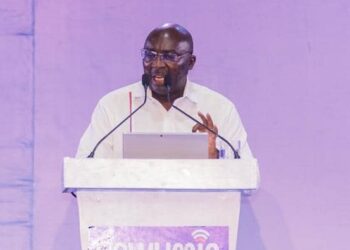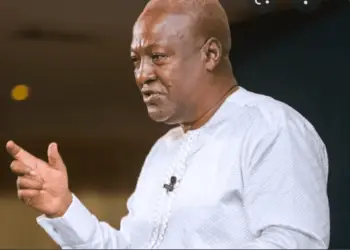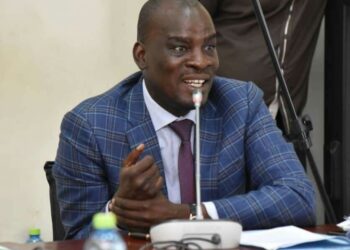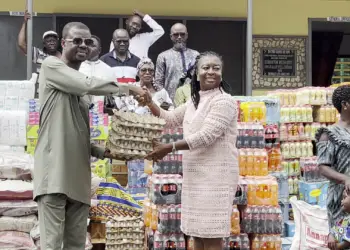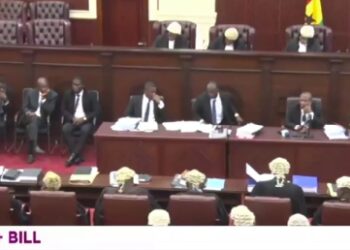There was a lot of anticipation among Ghanaians when President Akufo-Addo assumed office on January 7, 2017, as many believed he was going to turn around the fortunes of Ghana, based on his campaign and manifesto promises.
One of the most inspiring comments by the then Presidential candidate was his famous comment “Yeti Sika Su Nanso Ekom Di Yen” which when loosely translated means “we are sitting on a pile of money and yet we are hungry”.
This statement suggested that the Akufo-Addo government was going to turn around the fortunes of the country with the natural resources the country had.
After 6 years in power, the Akufo-Addo-led government has been criticized by various groups and persons for worsening the economic fortunes of the country despite its many promises.
Currently, Ghana is not in a very good place as far as issues regarding the economy are concerned. There have been concerns about price hikes and inflation, cedi depreciation, excessive borrowing, and downgraded credit rating among others.
https://googleads.g.doubleclick.net/pagead/ads?client=ca-pub-9851803229604827&output=html&h=280&adk=1862074107&adf=3974360050&pi=t.aa~a.2816640267~i.12~rp.1&w=455&fwrn=4&fwrnh=100&lmt=1661509101&num_ads=1&rafmt=1&armr=3&sem=mc&pwprc=1604435693&psa=1&ad_type=text_image&format=455×280&url=https%3A%2F%2Fpeacefmonline.com%2Fpages%2Flocal%2Fnews%2F202208%2F472990.php&fwr=0&pra=3&rh=369&rw=455&rpe=1&resp_fmts=3&wgl=1&fa=27&uach=WyJXaW5kb3dzIiwiMTAuMC4wIiwieDg2IiwiIiwiMTA0LjAuNTExMi4xMDIiLFtdLGZhbHNlLG51bGwsIjY0IixbWyJDaHJvbWl1bSIsIjEwNC4wLjUxMTIuMTAyIl0sWyIgTm90IEE7QnJhbmQiLCI5OS4wLjAuMCJdLFsiR29vZ2xlIENocm9tZSIsIjEwNC4wLjUxMTIuMTAyIl1dLGZhbHNlXQ..&dt=1661509101784&bpp=6&bdt=999&idt=7&shv=r20220822&mjsv=m202208220101&ptt=9&saldr=aa&abxe=1&cookie=ID%3Df401b86e41332f6a-2266d125dad300a4%3AT%3D1646221177%3ART%3D1653647823%3AS%3DALNI_MZOQRtPtiSBl-Ba-F5DxViMihtRFw&gpic=UID%3D000003bc77ca2103%3AT%3D1649417442%3ART%3D1661508596%3AS%3DALNI_Mas0a6N0jFtyAy9Qqc8jbaztEz5-A&prev_fmts=0x0%2C940x280%2C198x600%2C455x280&nras=3&correlator=5465262951888&frm=20&pv=1&ga_vid=2043607838.1646221184&ga_sid=1661508595&ga_hid=1906452361&ga_fc=1&u_tz=-120&u_his=8&u_h=768&u_w=1366&u_ah=728&u_aw=1366&u_cd=24&u_sd=1&dmc=4&adx=325&ady=2151&biw=1105&bih=550&scr_x=0&scr_y=0&eid=44759875%2C44759926%2C44759842%2C31069108%2C31068921&oid=2&pvsid=1102145119955019&tmod=2114177250&uas=0&nvt=1&eae=0&fc=1408&brdim=163%2C65%2C163%2C65%2C1366%2C0%2C1138%2C670%2C1122%2C550&vis=1&rsz=%7C%7Cs%7C&abl=NS&fu=128&bc=31&ifi=7&uci=a!7&btvi=3&fsb=1&xpc=BKjndilN1n&p=https%3A//peacefmonline.com&dtd=104
Aside from the above, corruption among some government appointees under the Akufo-Addo-led administration has also been cited on a number of occasions.
In some of these instances, the Akufo-Addo-led government has attributed its challenges to various factors. In the early part of his reign as president, the issues were mostly linked to mismanagement on the part of his predecessors, at certain points, there was COVID-19 and some others.
Here are some of the things Akufo-Addo and some of his appointees have blamed for the economic crisis.
John Dramani Mahama
Former President, John Dramani Mahama and his administration have been one of the reasons, cited on several occasions by the Akufo-Addo-led government for the economic woes of the country.
President Akufo-Addo, a year after the 2020 polls, for instance, blamed the NDC government for shrinking Ghana’s economy
“When we took over in 2017, Mahama-led NDC government had messed up the economy. You agree with me that within a short while, we managed to put the economy back on track to the extent that in 2017, we have economic growth of 8%,” he said while speaking at a sod-cutting event in Juabeng.
Vice president, Dr Mahamudu Bawumia on his part, also said the current economic crisis should to blamed on the John-Mahama-led administration as they inherited the banking sector crisis and a poorly-managed economy under the NDC government.
In a speech at the Accra Business School, the vice president said Ghana’s current economic challenges can be blamed on “the previous government.”
He further mentioned the banking sector clean-up and the excess capacity payments as the policies of the previous government which contributed to the economic mess.
COVID-19
Undoubtedly, COVID-19 had a negative impact on Ghana’s economy as much as it did on the global front but even after 2 years of the pandemic, the government is still blaming the country’s economic woes on the COVID-19 pandemic.
The first case of the virus was recorded in Ghana in March 2020 and halted many economic activities.
Despite the effect of this, many economies around the world appear to have found a way around growing back their economies albeit with some difficulty.
President Akufo-Addo said he was making headway in turning around the economy until COVID-19 hit hard.
The COVID-19 pandemic he said, washed away the gains the country had made in a short period.
Speaking at the Accra Business School on July 14, 2022, Vice President Dr Bawumia on his part said,
“COVID-19 and the Russia-Ukraine war were external and the other two (the banking sector clean up and the excess capacity payments) were the result of policies of the previous government,” he said
Russia Ukraine war
The Russia-Ukraine war in recent times has been blamed for sudden hikes in food prices and the high cost of living.
According to Akufo-Addo, the war between these two countries is having an impact on food security in the country.
The President further said that the Ukrainian crisis has compromised the food security of Africa, causing a disruption of commodity imports and shortages in fertilisers for crops.
“Growing concerns of fertiliser shortages in most African countries including Ghana are worrying.
“Ghana’s maize and soya production could be affected and our poultry industry could suffer greater shocks,” Akufo-Addo said.
Akufo-Addo also spoke about how crucial a steady supply of crude oil from Russia is to stabilizing rising energy prices and supply-demand disparities in commodities, especially in Ghana.
According to him, it could translate to increased global oil and liquefied natural gas prices which could adversely affect many importing countries.
“This means that fuel prices in the country are contingent on the ongoing conflict and likely to negatively impact Ghanaians, who, for apparent reasons, are already facing spikes in fuel prices,” he added.
“Although the Russian-Ukrainian crisis is not happening on African soil, the interconnectivity of the world economy and financial markets can trigger reactions in Ghana,” President Akufo-Addo stated.
“Already, fuel prices at various pumps in the country are inching towards the GH¢8 mark, causing transport fares to be increased by 15 per cent, effective February 26, 2022,” he added.
Despite all the above reasons, some groups, and persons have blamed the government for mismanaging the economy.
They have blamed the government for corruption, profligate spending like the use of an expensive, luxurious presidential jet, excessive borrowing, and a bloated government among others as self-inflicted.
SEND A STORY: Do you have a story for us or need a promotion / advertisement? Submit them via our email dannyboy744@gmail.com and via on +233 266777777



